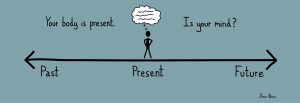Becoming More Mindful
Daniella's journey toward becoming more mindful.
Mindfulness is the practice of becoming more aware by paying attention to the present moment and can be practiced almost anywhere. While the definition and act of mindfulness sounds simple, in today’s world where we are constantly pressured to be productive, practicing mindfulness can be challenging. Today, I’d like to share with you how I have committed to becoming more mindful and what this journey has been like for me.
Since I have been working from home, I have been trying to take advantage of professional development opportunities to make the most of my time. At the beginning of the stay-at-home orders a co-worker suggested I take a Coursera course titled “The Science of Well-Being” taught by Laurie Santos, a professor at Yale. I was immediately intrigued by the course as my job is focused on teaching people about wellness and living a healthy life. I thought this would be a great course for me and maybe spark some ideas for future programs or events.
In the course I learned about misconceptions of happiness, why we have bad expectations, what really makes us happy, and how to put these strategies into practice. After learning about all the activities I could do to make me happy, it was time to make it happen. Professor Santos cited exercising at least 30 minutes every day, sleeping at least 7 hours every night, eating a well-balanced diet, practicing gratitude, and practicing mindful meditation were all proven to improve happiness.
Choosing an activity at first was a little challenging. I consider myself a fairly healthy person. I exercise 5 to 6 times a week, I eat a balanced diet, and I sleep at least 8 hours a night. Although I can confidently check off all three of those boxes, I still consider myself a pretty anxious person and I am easily stressed out. My stress is mostly triggered when I am concerned about my work performance. I hold onto an idea that everything must be perfect which is an unrealistic way to live, however letting go of this idea is difficult.
In the course, Santos cites that mindful meditation has been proven to have several benefits, including more positive moods, increased concentration, increased feelings of social connection, and improved memory. With all this research showing how effective meditation is, I had to give it a try and see if it would really alleviate some of my stress. At the start of week 7 of the course, I decided to commit to meditating for 3 minutes every day. I originally planned to start on a Monday, however it took two days of telling myself “I am going to meditate today” before it actually happened. So, that Wednesday of Week 7 of the course is when I officially started meditating every day.
 I knew there was no way I was going to just turn off everything in the room, close my eyes for 3 minutes, and successfully sit in silence, so I decided to look up some resources to help me get started on this meditation journey. First, I searched YouTube for “3-minute meditations” and found many great options, including very specific ones related to stress and anxiety, sleep, and more. After using YouTube, a couple times, I remembered that I had access to the Calm App, so I checked out what types of meditations this app offered. So far, this is the app I have used the most. It has an amazing amount of guided meditations. It has meditations for beginners, sleep, and self-care, as well as calming music and sleep stories.
I knew there was no way I was going to just turn off everything in the room, close my eyes for 3 minutes, and successfully sit in silence, so I decided to look up some resources to help me get started on this meditation journey. First, I searched YouTube for “3-minute meditations” and found many great options, including very specific ones related to stress and anxiety, sleep, and more. After using YouTube, a couple times, I remembered that I had access to the Calm App, so I checked out what types of meditations this app offered. So far, this is the app I have used the most. It has an amazing amount of guided meditations. It has meditations for beginners, sleep, and self-care, as well as calming music and sleep stories.
While there are amazing apps that offer great guided meditations, creating a new habit is challenging and takes a lot of work. As I moved into my second week of meditating and Week 8 of the course, I was tasked to tell people about my new practice, socially committing to this change. I told my boyfriend and co-workers about my practice. Talking about my meditation practice made me more invested in my commitment and more motivated to continue meditating.
The last week of the course, I was tasked to maintain a growth mindset, meaning that abilities and skills can grow through dedication and hard work. At the beginning of this course I thought I was always in a growth mindset, however after learning more I’ve realized that
 there have been many instances where I have had a fixed mindset. Through meditating every day, I have tried to stay open minded to my successes and areas of improvements. It is not easy trying to sit still for a period of time and focus solely on your breath, but I am trying every day.
there have been many instances where I have had a fixed mindset. Through meditating every day, I have tried to stay open minded to my successes and areas of improvements. It is not easy trying to sit still for a period of time and focus solely on your breath, but I am trying every day.
After completing the Science of Well-Being course and meditating almost every day for the last 4 weeks I have seen a change in my stress and mood. I feel more positive about my daily schedule and on most days, I look forward to my opportunity to meditate and practice mindfulness. Although the course is over, I plan to continue my commitment of practicing mindful meditation. I believe if I keep at it this will become a lifelong habit and I will continue to grow in my journey of becoming more mindful.





